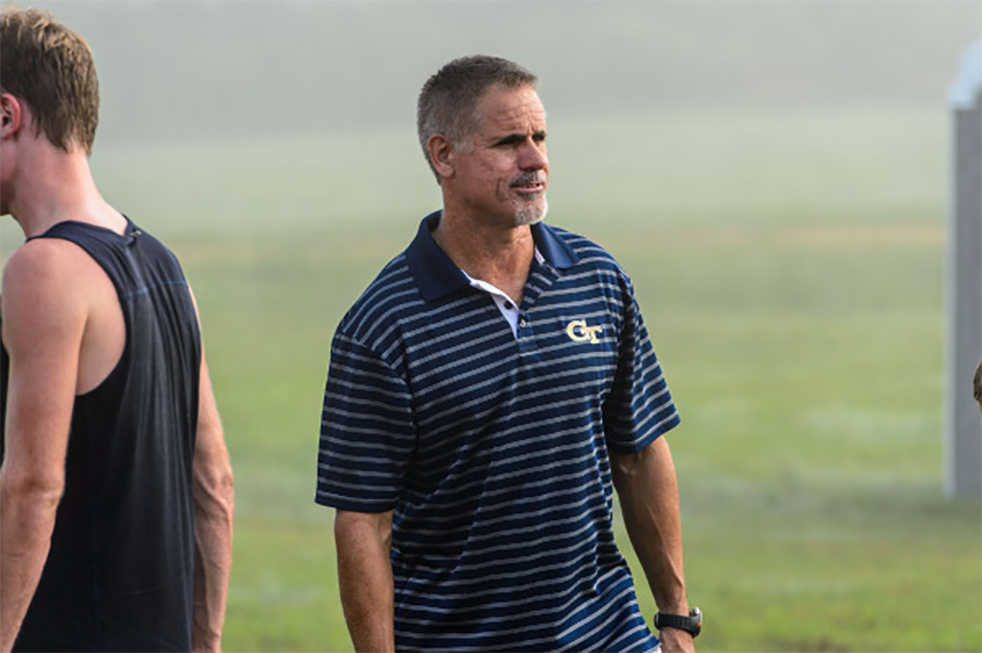In his 24th year as head coach for the men’s and women’s cross country (XC) teams and his 20th year as head coach for the women’s track and field team, Alan Drosky has spent a lifetime running. His coaching career, not to mention his three years as a standout Tech runner, has offered him a unique perspective on student-athlete XC runners. The Technique sat down with Drosky to discuss his tenure in Atlanta.
Technique: How did you first get involved with cross country?
Drosky: I had always played basketball in high school, so I knew I had good running ability just by the way I moved up and down the basketball court. I decided I would go out for cross country my senior year. I ended up being pretty good. I went from running three miles a day when I started to running 6–8 miles a day later in that fall.
Technique: Can you shed light on some of the unforeseen complexities and challenges that come with cross country running at the collegiate level?
Drosky: One saying I’ve seen on the back of high school cross country teams’ T-shirts is “Our sport is your sport’s punishment.” So in other sports, if you get in trouble, the punishment is to meet at 6 a.m. and run …. Well, we do that intentionally to train. In some aspects, it is just running, but in order to become successful at the collegiate level, it’s a lot more than that.
Technique: You’ve been coaching for a while now. How do you try to find ways to make improvements to your coaching strategy and how do you adapt to the changing styles of what produces cross country success?
Drosky: You start with the foundation of what you believe works. For us, [there is] a long term focus on aerobic development, … on increasing endurance, and … there are training methods that we know work to do this.
But every year, we are trying to figure out what works well and what doesn’t. Every year we’re trying to figure out how to get the new teammates acclimated and how each different person best receives training. It all starts with the core foundation
of what works.
Technique: What’s the most challenging part of your job?
Drosky: I think the most challenging is trying to get young people to buy into the things that are important for them to achieve success that aren’t
readily apparent.
I mean things like focusing on getting enough sleep, focusing on nutrition. College kids tend to feel like they’re bulletproof … the idea that you’re going to get nine hours of sleep each night kind of makes them laugh.
And I know that that’s a challenge, but I’m pushing them to do better — or at least start to do better — on those fronts, particularly with sleep and diets.
Technique: Are there any particular meets this season are you especially looking forward to?
Drosky: Well, we always look forward to the end because that’s what really matters: the ACC Championship and the NCAA South Regional. So those are the ones that you’re always looking forward to at the end.
During the regular season, … we are traveling to Minneapolis, Minn., for the Roy Griak Invitational. It’s a huge meet that we’ve been to years ago but haven’t been back [to] in a long time.
In the middle of October, we go to the Crimson Classic, which is over in Alabama on a course we [have] run …. The region meet this year is down in Tallahassee, but every other year it’s in Tuscaloosa, and so we always like to be on that course, so we’re looking forward to that.
Technique: Who are Tech XC’s primary rivals?
Drosky: Well, I think that Georgia is the natural rival, and we’ve had some good battles with them pretty much every year.
And then I think … we have a rivalry with the other ACC teams and maybe some of the SEC teams just because of location to them — teams like Tennessee, Alabama, Florida and Auburn.
Technique: How much do sleep, mental health and nutrition affect running?
Drosky: I think those things are paramount and very important. I would say sleep, nutrition and the mental side of it are of 50/50 importance with the actual training itself.
If you’re working hard, you’re going to make progress, but if you’re doing the sleep and nutrition side right, then you’ll make huge progress. (end of interview)
Coming off of a 2015 campaign that saw the men’s team finish No. 10 in the conference and No. 8 in the region while the women’s team finished No. 15 in the conference and No. 17 in the region, Drosky knows his team has a lot of room to improve.
In last weekend’s UGA Invitational, the team’s first race of the year, both teams placed a satisfactory second place.
After a solid start, the team will look to continue their training to improve upon last season’s results thanks to better nutrition and the benefit of more experience in cross country.
The Jackets’ next meet is the Roy Griak Invitational on Sep. 24 in Minneapolis, hosted by the University of Minnesota Golden Gophers team.
